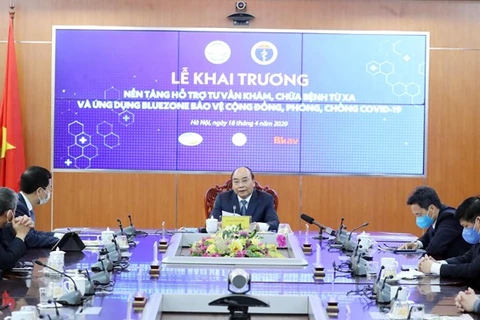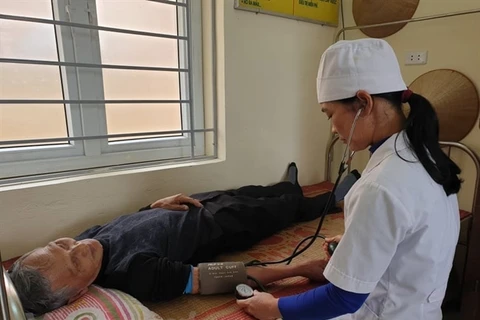 Professor Luong Ngoc Khue - Director of the Medical Examination and Treatment Department under the MoH. (Photo: VietnamPlus)
Professor Luong Ngoc Khue - Director of the Medical Examination and Treatment Department under the MoH. (Photo: VietnamPlus) Hanoi (VNA) – The Ministry of Health (MoH) is implementing a remote medical examination and treatment project for 2020-2025, with the aim of sustainable development of the health sector.
The system has been deployed in many hospitals such as Hanoi Medical University Hospital, National Paediatric Hospital, Hanoi Heart Hospital and K (Cancer) Hospital. It is estimated that when implemented nationwide, it will save the health sector tens of thousands of billions of VND each year.
According to Professor Luong Ngoc Khue - Director of the Medical Examination and Treatment Department under the MoH, the remote medical examination and treatment project is one of the focuses of the ministry at this time to build an unlimited medical network connecting health care facilities at all levels nationwide.
Counselling and support for grassroots-level health facilities is one of the tasks of central and upper-level hospitals. The work has been implemented by a number of medical facilities. However, the COVID-19 pandemic and the rising risk of emerging diseases required the health sector to take drastic measures to meet both epidemic prevention and socio-economic development goals, Khue said.
The project is built guided by the viewpoint of enhancing the professional capacity of lower-level hospitals, to help them achieve higher quality of treatment, he noted.
The project’s goals are that all people will be consulted, examined, treated, and supported by doctors from the communal to the central levels; and that people have access to quality health care services at lower-level medical establishments.
Staff of medical facilities will receive regular and irregular professional support from higher-level hospitals based on information technology platforms, Khue said, adding that this will contribute to preventing diseases, reducing overloading at higher-level health facilities, as well as improving the quality, efficiency of medical examination and treatment.
During the COVID-19 pandemic prevention period, the MoH has applied IT solutions to effectively implement remote treatment counselling and treatment. The National Steering Committee for COVID-19 Prevention and Control has established a management and administration centre to provide professional support in diagnosing and treating COVID-19 patients, Khue said.
The centre regularly organises online conferences and invites leading professors across the country to consult on serious cases, discuss optimal treatment methods for patients and share treatment and care experiences.
The establishment of such a management and administration centre marks a step forward along the trend of applying advanced scientific and technological achievements in medical treatment, especially amid the ongoing outbreak of COVID-19, he said.
A typical example of the effective IT application in implementing remote treatment and counselling activities is the case of the British pilot, patient 91. Leading experts regularly held online conferences to find the best solutions for treatment and thanks to that, the patient made a miraculous recovery.
 The remote medical examination and treatment project is being implemented in many hospitals (Photo: VietnamPlus)
The remote medical examination and treatment project is being implemented in many hospitals (Photo: VietnamPlus) The management centre for diagnosis and treatment of COVID-19 patients was developed in the first days when the outbreak began. It is one of seven works that were honoured in Vietnam’s Golden Book of Creativity by the Central Committee of the Vietnam Fatherland Front.
The centre is a testament to the success of remote examination and treatment consultation, which is expected to multiplied across the country, Khue said, stressing that to maintain and keep it efficient, it requires a series of legal corridors and policies.
He also underlined the need to strictly manage from information security, transmission lines, and technical lists for health insurance payment, to regulations for the implementation of consultation opinions at the upper level.
The Medical Examination and Treatment Department was assigned as the coordinator of the joint work among different departments of the MoH, the Authority of Information Technology Application under the Ministry of Information and Communications, and the State-run Viettel Military Industry and Telecoms Group, in rolling out solutions to ensure the legality of remote consultation meetings as well as technical elements for effective implementation of remote consultation and treatment, Khue said.
Currently, there are nearly 20 central hospitals able to conduct remote examination and treatment activities, of which Bach Mai Hospital has connected with 300 healthcare facilities, Viet Duc Hospital connecting with nearly 130 facilities and Hanoi Medical University Hospital connecting with nearly 200 ones.
A total of 1,000 facilities connected in a network is the number that the project is targeting, he said.
Currently there are 40 central hospitals nationwide; 492 provincial hospitals; 645 district hospitals; 72 hospitals owned by sectors; 275 private hospitals; 32,000 private clinics; and 11,000 medical stations. With such a foundation, the targeted number of 1,000 establishments involved in remote medical examination and treatment is completely feasible, Khue noted./.





















